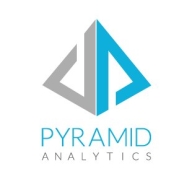

Pyramid Analytics and SAP Analytics Cloud are competitive products in the business analytics field. Data comparisons suggest SAP Analytics Cloud may have the upper hand due to its overall feature-rich capabilities, making it a more valuable investment compared to Pyramid Analytics' pricing and support advantages.
Features: Pyramid Analytics provides advanced analytics capabilities with self-service BI, robust integration, and flexibility. SAP Analytics Cloud offers comprehensive planning and predictive analytics, coupled with powerful data visualization and collaboration tools. The main distinction is SAP's focus on predictive analytics and collaborative planning, contrasting with Pyramid's emphasis on integration and data manipulation.
Room for Improvement: Pyramid Analytics could improve its user interface for easier navigation and simplify its setup process to enhance usability. More comprehensive customer training resources could also benefit its users. SAP Analytics Cloud might enhance its pricing structure to be more competitive and improve its graphic design tools for a smoother user experience. It can also expand support for non-SAP applications integration.
Ease of Deployment and Customer Service: SAP Analytics Cloud uses a cloud-based deployment model that facilitates easier access and scalability, supported by reliable customer service. Pyramid Analytics offers both on-premises and cloud deployment options, allowing greater control but requiring a potentially more complex setup process. SAP provides straightforward cloud deployment and Pyramid offers versatile options for control.
Pricing and ROI: Pyramid Analytics provides a favorable initial setup cost that might lead to quicker ROI due to cost-effective pricing. SAP Analytics Cloud, while possibly having a higher initial cost, offers significant long-term ROI with its extensive features and scalability, aligning with strategic business growth goals.


The BI Office from Pyramid Analytics is a web-based governed data discovery and analytics platform. It integrates the four principal functions of any comprehensive BI strategy into a single, seamless application. Users can now analyze, present, report and predict on their data in a single application. Pyramid Analytics has native apps to cover the entire mobile spectrum, iOS, Android and Windows. With BI Office users can integrate SAP data with data from other sources giving them the right tools and better data to make data-driven decisions.
SAP Analytics Cloud is an all-in-one Software-as-a-Service business intelligence tool that provides the key functionalities of an analytics tool to SAP business users. This tool is built on HANA Business Intelligence (BI) platform, providing analytics from data collected from multiple sources, such as ERP, Microsoft SQL, and Salesforce, among other solutions.
You can use SAP Analytics Cloud to compile data and perform ad-hoc reporting and analysis for predictive planning. SAP Analytics Cloud collects and analyzes the raw data from transactional systems into intelligent insights that allow you to make better decisions.
SAP Analytics Cloud uses machine learning to clean up data, identify errors, and issues, and suggest optimization or filtering options. You can use the modeling feature in Analytics Cloud to create hierarchies and get deeper data insights.
The three core functions of SAP Analytics Cloud consist of Planning, Predictive Analysis, and Business Intelligence as a holistic SaaS solution that offers real-time analysis to business leaders.
SAP Analytics Cloud Capabilities
SAP Analytics Cloud Key Features
SAP Analytics Cloud Benefits
Reviews from Real Users
Segun O., SAP HANA Developer at SOA PEOPLE, says that "The most valuable features are on the application side, where you can design applications into your analytics on the platform."
The Head of Finance Enterprise Application at a computer software company adds that "The visualization feature is the most valuable. SAP Analytics Cloud is also very easy to use."
"Its many features make it the best in the market," sums up a Consultor SAP Business Object, Sap Analytics Cloud at a tech services company.
We monitor all BI (Business Intelligence) Tools reviews to prevent fraudulent reviews and keep review quality high. We do not post reviews by company employees or direct competitors. We validate each review for authenticity via cross-reference with LinkedIn, and personal follow-up with the reviewer when necessary.